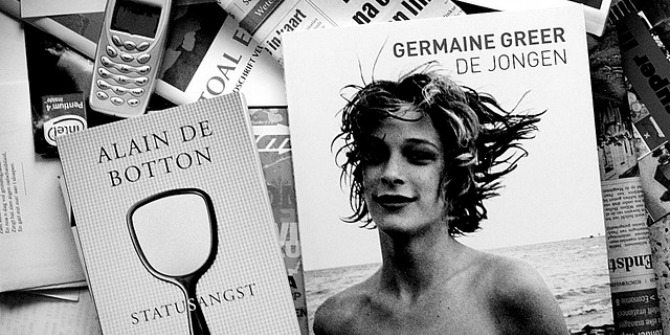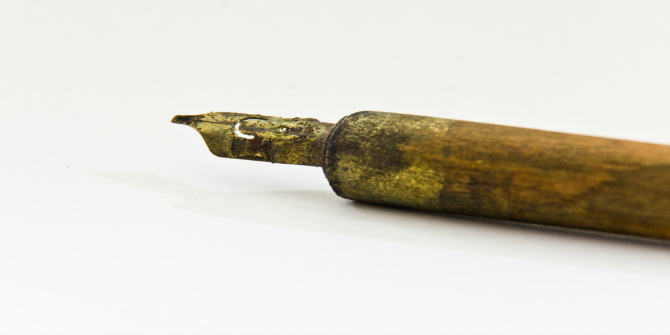 This important new volume seeks to provide a significant contribution to our understanding of religion and politics, demonstrating through comparisons with other countries the unusually complex nature of the interaction of religion and politics in the United Kingdom. John Anderson finds that the book offers robust analysis on secular Britain and media representation of religious identities.
This important new volume seeks to provide a significant contribution to our understanding of religion and politics, demonstrating through comparisons with other countries the unusually complex nature of the interaction of religion and politics in the United Kingdom. John Anderson finds that the book offers robust analysis on secular Britain and media representation of religious identities.

Politics and Religion in the United Kingdom. Steve Bruce. Routledge. October 2011.
During the recent Jubilee celebrations, church and state came together on several occasions to re-affirm their bond. This was most obvious in the service held at St Paul’s Cathedral, where the Archbishop of Canterbury foisted his liberal views on an unsuspecting royal party, according to an irate Daily Mail, but was also evident at the Jubilee Concert where Dr Rowan Williams could be seen singing along to Beatles’ tunes. For some the event was further evidence of the traditionalist commitment of the British public and their willingness to accept archaic features of our constitutional settlement. Others are more sceptical, and in this book sociologist Steve Bruce warns about confusing the Church of England’s ‘privileged access to the institutional equivalent of the dressing-up box’ with real political influence (p.30).
This book is a collection of essays, all of which are new or re-written, and those familiar with Steve Bruce’s numerous works on the sociology of religion will see how they elaborate on previous discussions. In particular, Bruce is known as a robust defender of the secularisation thesis, a sharp critic of rational choice approaches that see religious organisation as akin to firms operating in a religious marketplace, and sceptical about the arguments of some about a global resurgence of religion – in that sense he contradicts what has become almost a new orthodoxy about the role of religion in the public sphere.
This is not a systematic study of church-state relations in Britain, but rather a series of sketches elaborating how these relationships have evolved in recent years. Bruce is generally sceptical about claims for the growing importance of religion in the United Kingdom, but points to areas where religion and politics interact. The backdrop to this story is the rapid secularisation of Britain over the last fifty years, and he sees little real religious significance in the fact that the majority still claim to be Christian and doubts that this represents what another sociologist refers to as ‘believing without belonging’. For Bruce this identification masks a remarkable lack of content or serious knowledge of religious teaching and a declining residual religious capital that will further weaken the churches in future years.
In this context religion can seek to resist secularisation or adapt to it. In some parts of the country this has taken the form of sectarianism and narrow-minded religious bigotry, most obviously in Northern Ireland’s troubled past. Yet as someone who has argued that religion in a key factor in the conflict, Bruce also notes that the most violent individuals were usually the least personally religious, whilst many of the churches played a key role in encouraging reconciliation. Moving eastward he may provoke some reaction in a Scotland where anti-sectarianism is currently in vogue. In Bruce’s analysis this is misguided because ‘so-called sectarianism is not the tip of an iceberg of systematic prejudice and discrimination. It is the iceberg’ (72).
Some of these essays pick up on well-worked themes such as the relationship between Protestantism and democracy, or Methodism and socialism. Less familiar is the material exploring attempts to develop religious political action inBritainwhether through the creation of Christian political parties or promote US-style culture wars as a significant factor in electoral politics. Here the emphasis is on the differing opportunity structures in the UK, with a much smaller and less conservative religious base here reducing the potential constituency, whilst the structure of government, administration and media creates fewer battlegrounds within which to pursue these issues. At the same time Bruce asks whether the creation of elected mayors and greater devolution will offer new opportunities for moral crusaders.
More open is the question of ethnicity and religion, and whilst he is acutely aware of the dangers of essentialisation he offer a strong rebuttal to those who say that belonging to varying traditions may not have differing political consequences. To those who argue that we cannot or should not speak of ‘Islam’ or ‘Hinduism’ because they rake so many shapes and forms, he responds that ‘the denial of a shared identity to people who assert it seems as great an imposition as imputing a common identity to those who have little or nothing in common’ (140). Noting popular and tabloid concerns about the role of Islam, he suggests that all too often tensions occur because one party or another chooses to exacerbate them. At the same time he accepts that the particular issue of the political role of Islam is ‘delicately poised’ and dependent upon how specific issues are handled by both state and local communities.
Where does all this leave us? Religious issues are not going to go away and, if anything, are likely to become more prominent – witness the increasing number of religion stories in the media. But for Bruce all the data suggests that the public is largely happy with the privatisation of religion. Whilst this does not offer a comprehensive survey, and it would have been good to see a chapter on the actual and residual role of the Church of England in the public sphere south of Hadrian’s Wall, this is a book well worth reading. It offers robust analysis suggesting that claims of religious resurgence have more to do with ‘academic novelty-seeking’ than the realities of secular Britain.
————————————————————————–
John Anderson received his PhD from the London School of Economics in 1986. After a period of study in Moscow during 1987 he held teaching positions at the LSE, Westminster and Middlesex Universities before spending a year as Lecturer in Politics in Edinburgh University. He took up his position at St Andrews in 1991. Since coming to St Andrews he has taught extensively at all levels, with specialist modules focusing on post-Soviet politics, democratisation, and religion and politics. He has published six books, the most recent of which is Christianity and Democratisation:From Passive Subjects to Active Participants (Manchester University Press, 2009). His research interests lie primarily in the field of religion and politics, and he is currently researching on the politics of global Christianity, and on conservative Christian politics in Russia and the USA. Read more reviews by John.







This is a good review of what sounds like a very interesting book, but I couldn’t help grinding my teeth at the reference to the situation ‘south of Hadrian’s Wall’. I get very cross when people talk as if Hadrian’s Wall were synonymous with the English-Scottish border. It isn’t. I write a blog about what it’s like living on the border (www.debatable-land.blogspot.com); the post of 5.4.12 is about the Wall confusion.